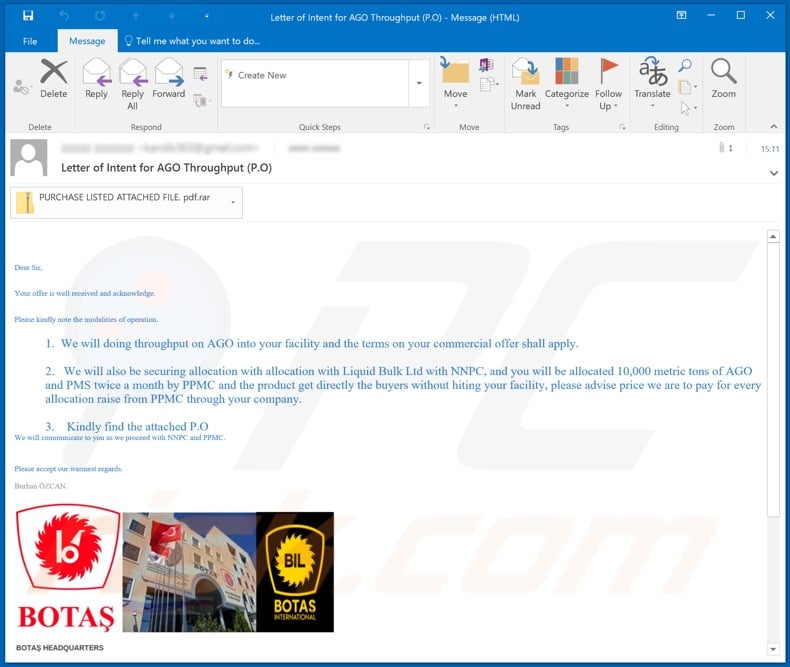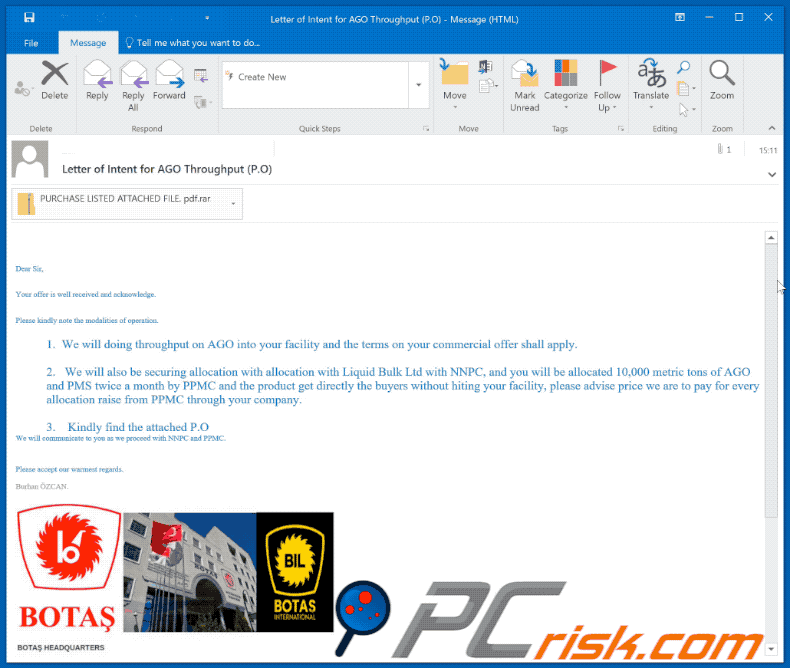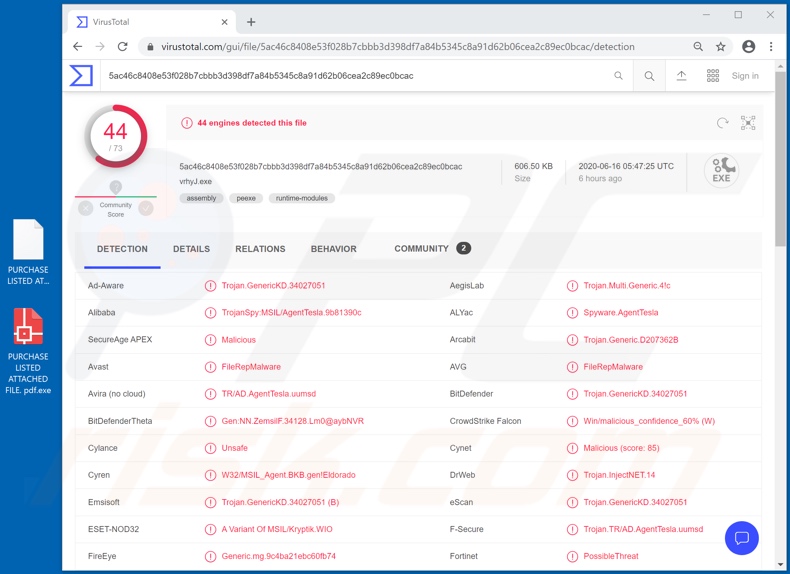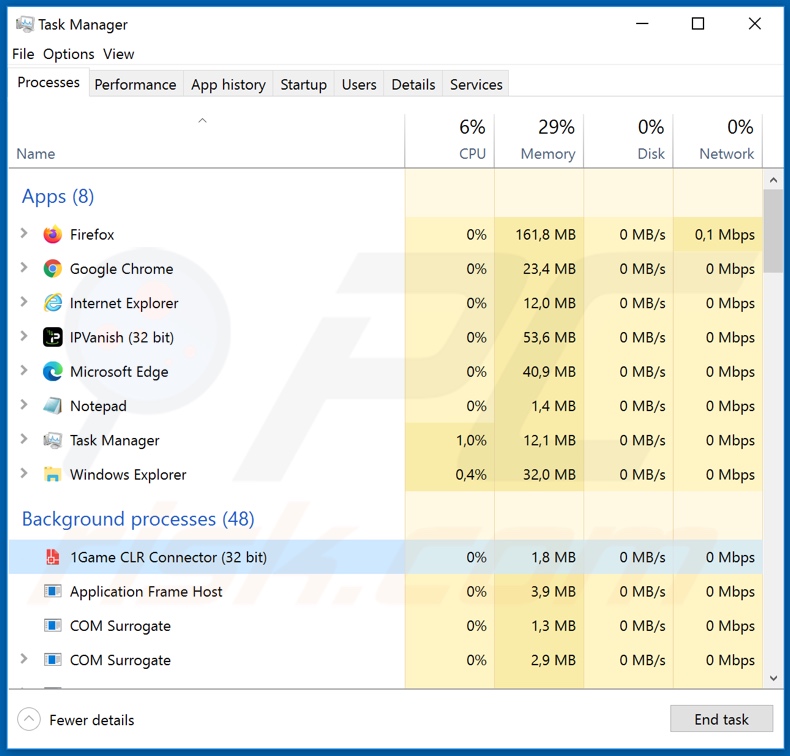Get free scan and check if your device is infected.
Remove it nowTo use full-featured product, you have to purchase a license for Combo Cleaner. Seven days free trial available. Combo Cleaner is owned and operated by RCS LT, the parent company of PCRisk.com.
What is the "BOTAS" email?
"BOTAS" is a spam email campaign designed to proliferate the TrickBot Trojan. These emails are disguised as mail from the Turkish Petroleum Pipeline Corporation (BOTAŞ). The file attached to the emails is disguised as a PDF document, however, this is in fact a malicious executable that installs TrickBot malware.
The primary function of this Trojan is stealing information. TrickBot is a sophisticated piece of malicious software, which has significant anti-detection capabilities. This malware poses a major threat to device and user safety.

The emails with the subject "Letter of Intent for AGO Throughput (P.O)" are presented as mail from BOTAŞ, a state-owned crude oil and natural gas pipelines and trading company in Turkey. These messages contain the logo of BOTAŞ, mention the CEO, and list the correct address of one the company's offices.
Despite the seemingly legitimate appearance of these emails, they are scams and are in no way associated with BOTAŞ. The files attached to the messages ("PURCHASE LISTED ATTACHED FILE. pdf.exe") supposedly contain important information concerning a purchase/order, however, when this file is executed, the infection process of TrickBot is initiated.
As mentioned, this Trojan is a highly dangerous program. This malware targets browsers - it can create fake web pages (e.g. log-in pages) from which entered information is sent straight to the cyber criminals. It can also extract data stored in browsers such as account log-in credentials (i.e. usernames and passwords), browsing histories, autofills, browser cookies, etc.
Note that TrickBot's targets are not limited to browsers - it can affect other applications as well (e.g. Microsoft Outlook, WinSCP, Filezilla, etc.) and extract sensitive information from them. Typically, these features are used to steal email, social networking/media, cryptocurrency wallet, online money transfer (e.g. PayPal), banking and various other accounts.
Additionally, some versions of the TrickBot Trojan can operate as screenlockers. Therefore, these variants can lock the victim's screen and demand ransoms for restoring access to the device. To summarize, trusting "BOTAS" emails can endanger the system, lead to financial loss, serious privacy issues and even identity theft.
If it is suspected/known that TrickBot (or other malware) has already infected the device, use anti-virus software to remove it immediately.
| Name | BOTAS spam |
| Threat Type | Trojan, password-stealing virus, banking malware, spyware. |
| Hoax | Emails are disguised as mail from BOTAŞ - crude oil and natural gas pipelines and trading company in Turkey. |
| Attachment(s) | PURCHASE LISTED ATTACHED FILE. pdf.exe |
| Detection Names | Avast (FileRepMalware), BitDefender (Trojan.GenericKD.34027051), ESET-NOD32 (A Variant Of MSIL/Kryptik.WIO), Kaspersky (HEUR:Trojan.MSIL.Crypt.gen), Full List Of Detections (VirusTotal). |
| Symptoms | Trojans are designed to stealthily infiltrate the victim's computer and remain silent, and thus no particular symptoms are clearly visible on an infected machine. |
| Payload | TrickBot |
| Rogue Process Name | 1Game CLR Connector (process name may vary) |
| Distribution methods | Infected email attachments, malicious online advertisements, social engineering, software 'cracks'. |
| Damage | Stolen passwords and banking information, identity theft, the victim's computer added to a botnet. |
| Malware Removal (Windows) |
To eliminate possible malware infections, scan your computer with legitimate antivirus software. Our security researchers recommend using Combo Cleaner. Download Combo CleanerTo use full-featured product, you have to purchase a license for Combo Cleaner. 7 days free trial available. Combo Cleaner is owned and operated by RCS LT, the parent company of PCRisk.com. |
Deceptive/Scam emails are distributed via large scale operations termed "spam campaigns". "Payments Due Email Virus", "Your purchase of BTC has started", "National Bank of Greece" and "Black Lives Matter Email Virus" are some examples of other spam campaigns that spread malware.
The messages are usually disguised as "official", "urgent", "priority", "important", and so on. As well as spreading malware (e.g. Trojans, ransomware, cryptominers, etc.), these emails can also serve phishing purposes or employ other scam models.
Regardless of what this deceptive mail claims, offers, requests or demands, the purpose is identical: to generate profit for the scammers/cyber criminals behind them. Therefore, you are strongly advised to exercise caution with received emails and ignore dubious mail from suspect/unknown senders.
How did "BOTAS Email Virus" infect my computer?
Systems are infected through malicious files sent during spam campaigns. The files can be attached to the emails or, alternatively, the messages can contain download links of infectious content. Infectious files can be in a wide variety of formats such as archives (ZIP, RAR, etc.), executables (.exe, .run, etc.), PDF and Microsoft Office documents, JavaScript, etc.
When they are executed, run or otherwise opened, the infection process is triggered (i.e. they begin downloading/installing malware). MS Office documents cause infections by executing malicious macro commands.
In Microsoft Office versions released before 2010, this process begins when the document is opened, however, newer versions have "Protected View" mode, which prevents macros being executed automatically upon opening - users are asked to enable macro commands (i.e. to enable editing/content), thus preventing infection (unless macros are manually enabled).
How to avoid installation of malware
Do not open suspicious or irrelevant emails, especially those with any attachments or links found in them, as this can result in high-risk system infection. Additionally, use Microsoft Office versions released after 2010.
Note that malware is also distributed via untrusted download sources (e.g. unofficial and free file-hosting sites, Peer-to-Peer sharing networks and other third party downloaders), illegal activation tools ("cracks") and fake updaters. Therefore, use official, verified download channels and activate and update programs with tools/functions provided by legitimate developers.
To ensure device integrity and user safety, it is paramount to have a reputable anti-virus/anti-spyware suite installed. Keep this software up to date and use it to run regular system scans and to remove detected threats.
If you have already opened "BOTAS Email Virus" attachment, we recommend running a scan with Combo Cleaner Antivirus for Windows to automatically eliminate infiltrated malware .
Text presented in the "BOTAS" email message:
Subject: Letter of Intent for AGO Throughput (P.O)
Dear Sir,
Your offer is well received and acknowledge.
Please kindly note the modalities of operation.
1. We will doing throughput on AGO into your facility and the terms on your commercial offer shall apply.
2. We will also be securing allocation with allocation with Liquid Bulk Ltd with NNPC, and you will be allocated 10,000 metric tons of AGO and PMS twice a month by PPMC and the product get directly the buyers without hiting your facility, please advise price we are to pay for every allocation raise from PPMC through your company.3. Kindly find the attached P.O
We will communicate to you as we proceed with NNPC and PPMC.
Please accept our warmest regards.
Burhan ÖZCAN.
BOTAŞ HEADQUARTERS
Address Bilkent Plaza A-II Blok, 06800 Bilkent / ANKARA
Phone +90 312 297 3000 (Pbx)
Fax +90 312 266 0433 & 266 0734
E-Mail info@botas.gov.tr
Kep botas.genelmudurluk@hs01.kep.tr
hxxps://www.botas.gov.tr/pages/contact-information/279
Appearance of "BOTAS" email message (GIF):

Screenshot of VirusTotal detections of the malicious attachment distributed via "BOTAS" spam campaign ("PURCHASE LISTED ATTACHED FILE. pdf.exe"):

Screenshot of TrickBot process in Windows Task Manager ("1Game CLR Connector" - process name might vary):

Instant automatic malware removal:
Manual threat removal might be a lengthy and complicated process that requires advanced IT skills. Combo Cleaner is a professional automatic malware removal tool that is recommended to get rid of malware. Download it by clicking the button below:
DOWNLOAD Combo CleanerBy downloading any software listed on this website you agree to our Privacy Policy and Terms of Use. To use full-featured product, you have to purchase a license for Combo Cleaner. 7 days free trial available. Combo Cleaner is owned and operated by RCS LT, the parent company of PCRisk.com.
Quick menu:
- What is BOTAS spam?
- Types of malicious emails.
- How to spot a malicious email?
- What to do if you fell for an email scam?
Types of malicious emails:
![]() Phishing Emails
Phishing Emails
Most commonly, cybercriminals use deceptive emails to trick Internet users into giving away their sensitive private information, for example, login information for various online services, email accounts, or online banking information.
Such attacks are called phishing. In a phishing attack, cybercriminals usually send an email message with some popular service logo (for example, Microsoft, DHL, Amazon, Netflix), create urgency (wrong shipping address, expired password, etc.), and place a link which they hope their potential victims will click on.
After clicking the link presented in such email message, victims are redirected to a fake website that looks identical or extremely similar to the original one. Victims are then asked to enter their password, credit card details, or some other information that gets stolen by cybercriminals.
![]() Emails with Malicious Attachments
Emails with Malicious Attachments
Another popular attack vector is email spam with malicious attachments that infect users' computers with malware. Malicious attachments usually carry trojans that are capable of stealing passwords, banking information, and other sensitive information.
In such attacks, cybercriminals' main goal is to trick their potential victims into opening an infected email attachment. To achieve this goal, email messages usually talk about recently received invoices, faxes, or voice messages.
If a potential victim falls for the lure and opens the attachment, their computers get infected, and cybercriminals can collect a lot of sensitive information.
While it's a more complicated method to steal personal information (spam filters and antivirus programs usually detect such attempts), if successful, cybercriminals can get a much wider array of data and can collect information for a long period of time.
![]() Sextortion Emails
Sextortion Emails
This is a type of phishing. In this case, users receive an email claiming that a cybercriminal could access the webcam of the potential victim and has a video recording of one's masturbation.
To get rid of the video, victims are asked to pay a ransom (usually using Bitcoin or another cryptocurrency). Nevertheless, all of these claims are false - users who receive such emails should ignore and delete them.
How to spot a malicious email?
While cyber criminals try to make their lure emails look trustworthy, here are some things that you should look for when trying to spot a phishing email:
- Check the sender's ("from") email address: Hover your mouse over the "from" address and check if it's legitimate. For example, if you received an email from Microsoft, be sure to check if the email address is @microsoft.com and not something suspicious like @m1crosoft.com, @microsfot.com, @account-security-noreply.com, etc.
- Check for generic greetings: If the greeting in the email is "Dear user", "Dear @youremail.com", "Dear valued customer", this should raise suspiciousness. Most commonly, companies call you by your name. Lack of this information could signal a phishing attempt.
- Check the links in the email: Hover your mouse over the link presented in the email, if the link that appears seems suspicious, don't click it. For example, if you received an email from Microsoft and the link in the email shows that it will go to firebasestorage.googleapis.com/v0... you shouldn't trust it. It's best not to click any links in the emails but to visit the company website that sent you the email in the first place.
- Don't blindly trust email attachments: Most commonly, legitimate companies will ask you to log in to their website and to view any documents there; if you received an email with an attachment, it's a good idea to scan it with an antivirus application. Infected email attachments are a common attack vector used by cybercriminals.
To minimise the risk of opening phishing and malicious emails we recommend using Combo Cleaner Antivirus for Windows.
Example of a spam email:

What to do if you fell for an email scam?
- If you clicked on a link in a phishing email and entered your password - be sure to change your password as soon as possible. Usually, cybercriminals collect stolen credentials and then sell them to other groups that use them for malicious purposes. If you change your password in a timely manner, there's a chance that criminals won't have enough time to do any damage.
- If you entered your credit card information - contact your bank as soon as possible and explain the situation. There's a good chance that you will need to cancel your compromised credit card and get a new one.
- If you see any signs of identity theft - you should immediately contact the Federal Trade Commission. This institution will collect information about your situation and create a personal recovery plan.
- If you opened a malicious attachment - your computer is probably infected, you should scan it with a reputable antivirus application. For this purpose, we recommend using Combo Cleaner Antivirus for Windows.
- Help other Internet users - report phishing emails to Anti-Phishing Working Group, FBI’s Internet Crime Complaint Center, National Fraud Information Center and U.S. Department of Justice.
Share:

Tomas Meskauskas
Expert security researcher, professional malware analyst
I am passionate about computer security and technology. I have an experience of over 10 years working in various companies related to computer technical issue solving and Internet security. I have been working as an author and editor for pcrisk.com since 2010. Follow me on Twitter and LinkedIn to stay informed about the latest online security threats.
PCrisk security portal is brought by a company RCS LT.
Joined forces of security researchers help educate computer users about the latest online security threats. More information about the company RCS LT.
Our malware removal guides are free. However, if you want to support us you can send us a donation.
DonatePCrisk security portal is brought by a company RCS LT.
Joined forces of security researchers help educate computer users about the latest online security threats. More information about the company RCS LT.
Our malware removal guides are free. However, if you want to support us you can send us a donation.
Donate
▼ Show Discussion